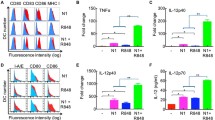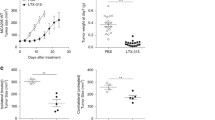Abstract
Mitigation of regulatory T cell-mediated immunosuppression and elicitation of immunogenic tumor cell death are crucial events for optimal anti-tumor immune activity in vivo. This study was designed to investigate the potential synergistic activity of the combined use of cyclophosphamide (CP) and doxorubicin (DR), both of which are known to resolve these two issues. BALB/c mice were inoculated subcutaneously with CT-26 carcinoma cells in the bilateral flank and treated with an intraperitoneal injection of a low dose of CP followed by an intratumoral injection of DR into one side of the tumor. We found that, in addition to a significant suppression of growth on the DR-treated side of the tumor, combination therapy suppressed the growth of DR-untreated remote tumors in both tumor-specific and T cell-dependent manners. Mitomycin C showed no such synergistic anti-tumor activity with CP treatment. Combination therapy increased the frequency of interferon (IFN)-γ-producing T lymphocytes specific to a CT-26-associated class I-binding tumor peptide in the tumor-draining lymph nodes. Real-time PCR analysis revealed that combination therapy led to an increase in IFN-γ and tumor necrosis factor-α mRNA expression; however, levels of Foxp3 and transforming growth factor-β within the remote tumor tissues were decreased. In addition, knock down of calreticulin expression in CT-26 cells using small interfering RNA attenuated anti-tumor vaccine effects induced by DR-treated CT-26 cells. These results provide an immunological rationale for the combined use of chemotherapeutic drugs, i.e., CP and DR, and further recommend their use with current cancer vaccines.







Similar content being viewed by others
References
Boon T, Coulie PG, Van der Eynde BJ, Van der Bruggen P (2006) Human T cell responses against melanoma. Annu Rev Immunol 24:175–208
Novellino L, Castelli C, Parmiani G (2005) A listing of human tumor antigens recognized by T cells: March 2004 update. Cancer Immunol Immunother 54:187–207
Rosenberg SA, Yang JC, Schwartzentruber DJ et al (1998) Immunologic and therapeutic evaluation of a synthetic peptide vaccine for the treatment of patients with metastatic melanoma. Nat Med 4:321–327
Nestle FO, Alijagic S, Gilliet M et al (1998) Vaccination of melanoma patients with peptide- or lysate-pulsed dendritic cells. Nat Med 4:328–332
Jager E, Gnjatic S, Nagata Y et al (2000) Induction of primary NY-ESO-1 immunity: CD8+ T lymphocyte and antibody responses in peptide-vaccinated patients with NY-ESO-1+ cancers. Proc Natl Acad Sci USA 97:12198–12203
Mine T, Sato Y, Noguchi M et al (2004) Humoral responses to peptides correlate with overall survival in advanced cancer patients vaccinated with peptides based on pre-existing, peptide-specific cellular responses. Clin Cancer Res 10:929–937
Rosenberg SA, Yang JC, Restifo NP (2004) Cancer immunotherapy: moving beyond current vaccines. Nat Med 10:909–915
Yamaguchi T, Sakaguchi S (2006) Regulatory T cells in immune surveillance and treatment of cancer. Semin Cancer Biol 16:115–123
Ostrand-Rosenberg S, Sinha P (2009) Myeloid-derived suppressor cells: linking inflammation and cancer. J Immunol 182:4499–4506
Curiel TJ, Coukos G, Zou L et al (2004) Specific recruitment of regulatory T cells in ovarian carcinoma fosters immune privilege and predicts reduced survival. Nat Med 10:942–949
Sato E, Olson SH, Ahn J et al (2005) Intraepithelial CD8+ tumor-infiltrating lymphocytes and a high CD8+/regulatory T cell ratio are associated with favorable prognosis in ovarian cancer. Proc Natl Acad Sci USA 102:8538–18543
Onizuka S, Tawara I, Shimizu J, Sakaguchi S, Fujita T, Nakayama E (1999) Tumor rejection by in vivo administration of anti-CD25 (interleukin-2 receptor α) monoclonal antibody. Cancer Res 59:3128–3133
Ko K, Yamazaki S, Nakamura K et al (2005) Treatment of advanced tumors with agonistic anti-GITR mAb and tits effects on tumor-infiltrating Foxp3+CD25+ CD4+ regulatory T cells. J Exp Med 202:885–891
Nishikawa H, Kato T, Hirayama M et al (2008) Regulatory T cell-resistant CD8+ T cells induced by glucocorticoid-induced tumor necrosis factor receptor signaling. Cancer Res 68:5948–5954
Loeffler M, Kruger JA, Reisfeld RA (2005) Immunostimulatory effects of low dose cyclophosphamide are controlled by inducible nitric oxide synthase. Cancer Res 65:5027–5030
Liu JY, Wu Y, Zhang XS et al (2007) Single administration of low dose cyclophosphamide augments the antitumor effects of dendritic cell vaccine. Cancer Immunol Immunother 56:1597–1604
Wada S, Yoshimura K, Hipkiss EL et al (2009) Cyclophosphamide augments antitumor immunity: studies in an autochthonous prostate cancer model. Cancer Res 69:4309–4318
Ghiringhelli F, Larmonier N, Schmitt E et al (2004) CD4+ CD25+ regulatory T cells suppress tumor immunity but are sensitive to cyclophosphamide which allows immunotherapy of established tumors to be curative. Eur J Immunol 34:336–344
Ghiringhelli F, Menard C, Puig PE et al (2007) Metronomic cyclophosphamide regimen selectively depletes CD4+ CD25+ regulatory T cells and restores T and NK effector functions in end stage cancer patients. Cancer Immunol Immunother 56:641–648
Roux S, Apetoh L, Chalmin F et al (2008) CD4+ CD25+ Tregs control the TRAIL-dependent cytotoxicity of tumor-infiltrating DCs in rodent models of colon cancer. J Clin Invest 11:3751–3761
Reis E, Sousa C (2004) Activation of dendritic cells: translating innate into adaptive immunity. Curr Opin Immunol 16:21–25
Casares N, Pequignot MO, Tesniere A et al (2005) Caspase-dependent immunogenicity of doxorubicin-induced tumor cell death. J Exp Med 202:1691–1701
Obeid M, Tesniere A, Ghiringhelli F et al (2007) Calreticulin exposure dictates the immunogenicity of cancer cell death. Nat Med 13:54–61
Apetoh L, Ghiringhelli F, Tesniere A et al (2007) Toll-like receptor 4-dependent contribution of the immune system to anticancer chemotherapy and radiotherapy. Nat Med 13:1050–1059
Apetoh L, Obeid M, Tesniere A et al (2007) Immunogenic chemotherapy: discovery of a critical protein through proteomic analysis of tumor cells. Cancer Genomics Proteomics 4:65–70
Tesniere A, Apetoh L, Ghiringhelli F et al (2008) Immunogenic cancer cell death: a key-lock paradigm. Curr Opin Immunol 20:504–511
Huang AY, Gulden PH, Woods AS et al (1996) The immunodominant major histocompatibility complex class I-restricted antigen of a murine colon tumor derives from an endogenous retroviral gene product. Proc Natl Acad Sci USA 93:9730–9735
Suzuki E, Kapoor V, Jassar AS, Kaiser LR, Albelda SM (2005) Gemcitabine selectively eliminate splenic Gr-1+/CD11b+ myeloid suppressor cells in tumor-bearing animals and enhance antitumor immune activity. Clin Cancer Res 11:6713–6721
Ko HJ, Kim YJ, Kim YS et al (2007) A combination of chemoimmunotherapies can effectively break self-tolerance and induce antitumor immunity in a tolerogenic murine tumor model. Caner Res 49:181–185
Chan OT, Yang LX (2000) The immunological effects of taxanes. Cancer Immunol Immunother 49:181–185
Garnett CT, Schlom J, Hodge JW (2008) Combination of docetaxel and recombinant vaccine enhance T-cell responses and antitumor activity: effects of docetaxel on immune enhancement. Clin Cancer Res 14:3536–3544
Green DR, Ferguson T, Zitvogel L, Kroemer G (2009) Immunogenic and tolerogenic cell death. Nat Rev Immunol 9:353–363
Ghiringhelli F, Apetoh L, Tesniere A et al (2009) Activation of the NLRP3 inflammasome in dendritic cells induces IL-1β-dependent adaptive immunity against tumors. Nat Med 15:1170–1178
Acknowledgments
We thank Ms. Yoko Ono and Ms. Yoshimi Fujii for their technical assistance. The English in this document has been checked by at least two professional editors, both native speakers of English. This study was supported in part by grants from the Ministry of Education, Science, Sport, Culture, and Technology of Japan (no. 18591449 to M. H. and no. 20790930 to N. H) and from the Shimane University Medical Education and Research Foundation.
Author information
Authors and Affiliations
Corresponding author
Rights and permissions
About this article
Cite this article
Tongu, M., Harashima, N., Yamada, T. et al. Immunogenic chemotherapy with cyclophosphamide and doxorubicin against established murine carcinoma. Cancer Immunol Immunother 59, 769–777 (2010). https://doi.org/10.1007/s00262-009-0797-1
Received:
Accepted:
Published:
Issue Date:
DOI: https://doi.org/10.1007/s00262-009-0797-1




